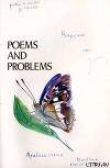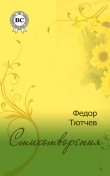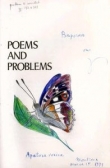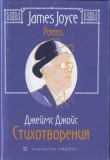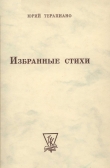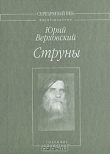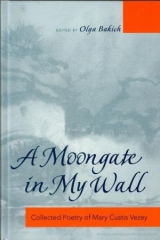
Текст книги "A moongate in my wall: собрание стихотворений"
Автор книги: Мария Визи
Жанр:
Поэзия
сообщить о нарушении
Текущая страница: 1 (всего у книги 19 страниц)
Мария Визи. A moongate in my wall: собрание стихотворений
Boris Thomson. Foreword
Mary Custis Vezey is a little-known poet of the Russian post-1917 diaspora. She is unusual among emigre writers for two reasons: first, that she spent most of her life in China or the United States, and so did not consider herself an emigre; and second, that she wrote in both Russian and English (indeed her first book contains poems in both languages). She comes from the Chinese branch of the Russian diaspora; its work is much less well-known than those of the European and North American emigre communities.
Mary Vezey published three books of lyric poetry in her lifetime, and many individual poems in a variety of journals and occasional collections. She was also a translator into both Russian and English. Most of her poems are less than twenty lines long, and only a few run to more than fifty. Like many Russian poets who grew up in the 1920s, she chose to follow the more conservative styles of Blok (1880–1921), Gumilev (1886–1921), Akhmatova (1889–1966), and Esenin (1895–1925) – indeed she translated poems by the first three of these – as representatives of a culture that seemed under threat from the Revolution. This allegiance takes the form of themes (in particular, nostalgia and escapism), imagery, rhymes and rhythmic preferences. In her first collections (1929 and 1936) her own individuality is often obscured by these more powerful voices, but her work of the 1950-1980s is more independent. She displays a great interest in technique; several poems exhibit a new rhyming virtuosity, while quite a few are unrhymed, which was unusual in the tradition which she had previously followed. An unexpected development of this period is the attempt to work in the conventions of classical Chinese poetry, which she also translated in these years. In her translations, she shows a widening of interests, not just in the favourite poets of her youth, but also in such difficult poets as Marina Tsvetaeva, of whom she produced some of the best translations in English known to me.
Dr Bakich has performed a valuable service in assembling this collection from a host of rare and almost inaccessible literary journals. It will introduce readers to a new voice in Russian poetry, quiet, perhaps, but once one has caught its tone, individual and memorable. Mary Vezey may be a minor poet, but she is a real poet, none the less.
Boris Thomson
Professor Emeritus
University of Toronto
Ольга Бакич. Введение(на англ. языке)
This book will bring belated recognition and appreciation to a bilingual poet, Mary Custis Vezey (1904–1994), who has left us a fine heritage of published and unpublished works.
Born in New York of a Russian mother and an American father, she lived in Russia, China, and the USA. Her three collections of predominantly Russian poetry came out in the cities of Russian emigration – Harbin (1929), Shanghai (1936), and San Francisco (1973) – and some of her poems appeared in Russian emigre periodicals. Her Russian poetry belongs to the splendid literature created by the first-wave emigres, forced to leave Russia after the 1917 Revolution and the Civil War. In the Russian diaspora in China, her contemporaries included lustina Kruzenshtern-Peterets (19031983), Marianna Kolosova (1903–1964), Nikolai Peterets (1907–1944), Olga Skopichenko (1908–1997), Natalia Reznikova (1908–1998?), Nikolai Svetlov (1908–1970?) and Sergei Sergin (1908–1934). In Europe and the USA, she belongs to the generation of Nina Berberova (1901–1993), Vladimir Smolenskii (1901–1961), Boris Poplavskii (1903–1935), Sofia Pregel' (1904–1973), Gertruda Vakar (1904–1973), Jurii Ivask (1907–1986), Jurii Mandel'shtam (1907–1943), Lazar' Kel'berin (1907–1989), Anatolii Shteiger (1907–1944), Lidila Alekseeva (1908–1989), and Igor' Chinnov (1909–1996).
At the same time, Mary Vezey was an American poet: both the Russian and the English language were native to her. All her life she felt that she had “two homes»[1]1
Letter from V. Pereleshin to M. Vezey, 11 June 1973. All translations from Russian in this introduction are mine. OB.
[Закрыть].I In 1990, she wrote: "In Russia my poems are now published as emigre poetry, but I am not an Emigre at all. Although I write in Russian, I am an eleventh-generation American! Recently, a wonderful (though terrifying) series 'The Civil War' was shown on television, and I felt it very keenly. I saw several of my relatives (southerners) there. When my schoolmates in a Russian school had asked me who I was, a Russian or an American, I had proudly answered that I was hundred per cent Russian and hundred per cent American»[2]2
Letter from M. Vezey to O. Bakich, 28 September 1990.
[Закрыть]. She also deeply loved China, the home of her youth; the images of these three countries intertwine in a dreamy surrealist image in a late, unfinished poem (poem 486)[3]3
Poem numbers refer to the numbering of this collection.
[Закрыть]. «Even if I'll never sail / in my tiny boat, / neither in dreams, nor awake, / on the Amazon, / yet I will always, / as long as I live,/keep the memory of the Neva River/on a Chinese junk-boat.»
Mary Custis Vezey, or Mariia Genrikhovna Vizi (as she was known in Russian), was born on 17 January 1904 in New York. Her father, Henry Custis Vezey (1873–1939) was an American. His ancestors moved from England to the USA at the beginning of the 17th century and became related to the American family Custis, to the first American president George Washington, and to General Lee, the leader of the Confederates in the American Civil War. As a young man, Henry Custis Vezey went to Europe, studied languages, and worked in Paris. At the end of the 19th or in the early 20th century, he worked at the American Embassy in St. Petersburg, becoming a Vice-Consul in 1914. During the First World War, he edited and published an English-language newspaper Russian Daily News, and later a bulletin Russkih News Letter (Translations from Russian Newspapers)[4]4
A few issues of Russian News Letter (Translations from Russian Newspapers) – no 531, 2/15 March 1917; no 533, 4/17 March 1917; no. 534, 5/18 March 1917 – are preserved in the Archive James Colt Wood Papers, 1908–1923. Folder 4. Russia 1917.
[Закрыть]. Genrikh Genrikhovich Vizi, as Russians called him, came to speak perfect Russian. He married Mariia Platonovna Travlinskaia (1974–1950), granddaughter of an archpriest of the lsaakievskii Cathedral, M.F. Raevskii, and they had two children: Vladimir (12 July 1902) and Mary (17 January 1904).
Mary Vezey was four weeks old, when the family returned to Russia from a visit to New York. In St. Petersburg, Vladimir and Mary grew up bilingual, if not trilingual: Russian, English, and French. Her French was such that she wrote poems in French as well, but they were not preserved, as she modestly felt that they "should be first shown to a person who knows the language properly, not the way I do."[5]5
Letter from M. Vezey to O. Bakich, 28 March 1994.
[Закрыть] Her Russian childhood was happy: a good school, theatres, ballets, concerts, vacations at Kuokkala on the shores of the Gulf of Finland, Finland then being a part of the Russian empire. Known as «the Northern Riviera,» Kuokkala was a resort popular among Russian artistic and literary circles, and several prominent writers and painters had cottages there.
After the 1917 Revolution in Russia, Henry Vezey was transferred to the American Consulate in Harbin. The family thus settled in China, but Harbin, a major railway junction of the Chinese Eastern Railway built by Russia in 1898–1903, was in many respects a Russian city. By 1917, the junction had grown into a large city of some 70 thousand Russian and Chinese inhabitants. In the early 1920s, the population rapidly increased with the arrival of some 200 thousand Russian emigres. For some time after the Russian Revolution, the Chinese Eastern Railway retained its old, predominantly Russian administration, and Harbin had Russian churches, clubs, theatres, schools, and several post-secondary institutions. In spite of the drastic political changes of the 1920s and 1930s, the diminishing population of Harbin Russians succeeded in maintaining a semblance of Russian pre-revolutionary life until the end of the Second World War.
In the early 1920s, Henry Vezey became editor-publisher of the Harbin English newspaper Russian Daily News, soon renamed Harbin Daily News, registered at the American Consulate-General in Harbin. The newspaper had supplements in Russian. The forced move from St. Petersburg (renamed Petrograd in 1914) across Russia on the brink of the devastating Civil War to distant and unknown China was a great change for his fourteen-year-old daughter. In a poem written in 1921, she addressed the poet A.S. Pushkin, saying that had "the great Russian genius" been alive, "your heart would have constricted with a terrible pain,/You would have burned with pain and shame/For that Russia, which always / Seemed holy" (poem 268).
She started writing poetry at the age of six. Her first efforts were in Russian, and a teacher, impressed by a poem submitted in class, began her encouraging comment with the words "To the Future Poet."[6]6
Note by M. Vezey on the manuscript of the poem “V ogromnykh” (In the enormous) (poem 376).
[Закрыть] At sixteen, Mary Vezey wrote: «I don't want to be a poet / In order to enjoy poetic laurels, /And not in order to shine /With an empty glory in this world,» foreseeing a life guided not by the approval of others, but by inspiration and by «one glorious realization / That I am a poet, for that's what happiness is!» (poem 247). In an early English poem, «A Prayer» (poem 493), she said: «Give me the soul of a poet,/That's filled with music and love…» At the same time, the seventeen-year old poet observed with a touch of humour: «Alas, the languages of all the world's nations / Are so poor that the word „poet“ / Is a definition of Shakespeare / And … (oh, innocent satire!) / Of me; there is no other» (poem 270).
Favourite poets of her childhood were A.S. Pushkin and M.lu. Lermontov. Adolescence and youth brought admiration for the Silver Age of Russian poetry, particularly for Alexander Blok, Nikolai Gumilev, and Anna Akhmatova. Blok was seen as the very essence of poetry: "in our youth we were 'discovering' Blok on our own, we fell in love with him, and this love stayed with us for the rest of our lives. (…) There will be no other Blok for us."[7]7
M. Vizi “Vospominanija o Bloke” (Memories of Blok), Russkaja zhizn (Russian Life) San Francisco, August 1982.
[Закрыть]
In Harbin, Mary Vezey continued her education at the prestigious Girls' School of the Harbin Commercial Schools. Musia, as Russian friends called Mary, retained fond memories of this excellent Russian school and formed several lifelong friendships there. In 1921–1922, she studied at the North China American School run by the American Presbyterian Mission for children of American missionaries and other English-speaking foreigners, in the city of Tongzhou near Beijing. Her English poems of these years (poems 500, 501) and an imaginary diary of her future life as a painter appeared in the school annual N.C.A (The North China American)[8]8
The N.C.A., 1920–1922, p. 14–16, 43, 52, 56, 66.
[Закрыть]. In the spring of 1922, Mary Vezey graduated from both the North China American School and the Harbin Commercial Schools[9]9
N.P.A. (N.P. Avtonomov), «Spiski okonchivshikh (1910–1925 gg.)» (Listsof Graduates (1910–1925), Харбинское коммерческое училище Китайско-Восточная железная дорога. (Harbin Commercial Schools of the Chinese Eastern Railway, San Francisco, no. 5, 1958, p. 18.
[Закрыть], and worked for a couple of years as a secretary to Howard Lee Haag, Chief Secretary of the Harbin branch of the YMCA. The branch, opened in the early 1920s, maintained a Russian gymnasium, various professional evening courses for Russian emigres, and several sport and cultural organizations and activities.
In 1925, Mary Vezey sailed, via Japan, to the USA to study at Pomona College (presently one of the six Claremont Colleges) in Claremont, California; her major was Languages and Literatures. In her two academic years at Pomona, she participated in the YWCA, Le Cercle Franca is, the Daubers Art Club, and the Cosmopolitan Club, the latter promoting friendship and understanding between Americans and foreign students. She also worked on Metate, an annual publication by the junior class. Her poetry in English gained recognition, and she was invited to join the Scribblers Society, founded in 1913 by Professor William Sheffield Ament. Membership, limited to twelve, was by invitation only and based on writing ability. The Society's journal, Scribblers Magazine, renamed Manuscript in 1925, published her article "Chinese Poetry during the T’ang Dynasty" and two poems, one of which, "Chinese Serenade" (poem 69), was awarded an honourable mention by the journal Inter-Collegiate World and reprinted.[10]10
Mary Vezey, «Chinese Poetry during the T'ang Dynasty,» Manuscript, Pomona College, v. 2, no. 3, May 1925, p. 14–17; Mary Vezey, «Chinese Serenade.» Ibid., v. 3, no. I, November 1925, p. 11 (poem 69 in this collection); Mary Vezey, «Fortune Teller,» Ibid., v. 3, no. 3, March 1926, p. 19 (poem 72); Mary Vezey, «To R,» Ibid, v. 3, no 3, March 1926, p. 27 (poem 60); «Editor Koempel Says Book Will Appear March 15,» Student Life, no. 54, 17 February 1926, p. I.
[Закрыть]
Returning to Harbin, Mary Vezey worked for her father's newspaper and at various firms which required knowledge of both Russian and English. She continued to write poetry, but did not participate in the "Young Chu-raevka," a Harbin literary circle established at the YMCA by its Russian secretary, Harbin poet Aleksei Achair (Aleksei Alekseevich Gryzov, 1896–1960). Its young members (future Harbin and Shanghai poets Larissa Andersen, Georgii Granin, Valerii Pereleshin, Nikolai Peterets, Sergei Sergin, Nikolai Shchegolev, Vladimir Slobodchikov, Mikhail Volin, and others, most a little younger than she was) held literary and cultural evenings, invited guest speakers, and formed a poetry workshop to read and discuss their works. Henry Vezey was on the Board of Directors of the Harbin YMCA, and it is noteworthy that it was not one of the many Harbin Russian newspapers, but Henry Vezey's American Harbin Daily News that published six weekly issues of the circle's literary newspaper as a supplement.[11]11
«Molodaia Churaevka,» No. 1 (7 July l932)-No. 6 (6 August 1932), a weekly supplement to Harbin Daily News.
[Закрыть]
As one Harbin poet and journalist recalled, "Mary Vezey, slim Musia, American by father, Russian by mother, by-passed 'Churaevka/ She knew many of its members; she had attended the same school with many of them. Her family was well known in the city; everyone knew her father, the editor of the only American newspaper in the city. Musia, had she wished, could easily have caused a sensation, but she did not strive to publish or to recite her poetry, she was 'hiding/ and only a few had a chance to appreciate her musical, pure lyrics. Finally, she was talked into publishing a book of poetry. It came out in Harbin and was quickly sold out."[12]12
Ju.V. Kruzenshtern-Peterets, «Churaevskii pitomnik (O dal'nevostochnykh poetakh)» (Cluiraevka Nursery (On the Far-Eastern Poets)), Vozrozhdenie (Resurrection), Paris, no. 204, December 1968, p. 54–55
[Закрыть]
This book was her first collection, simply entitled Stikhotvoreniia (Poems), with an epigraph from Anna Akhmatova; "The body cannot live / without the sun, the soul – without a song."[13]13
Akhmatova's lines are from the poem «Skazal, chto u menia sopernits net» (He said that I have no competitors). Anno Domini, Petrograd, 1921, and Berlin, 1923, later translated by Mary Vezey into English (poem 578).
[Закрыть] Among many Russian books published in Harbin at the time, it stood out by being bilingual. The cover in Russian was followed by two title pages, in Russian and in English. The book contained 127 poems in Russian, 13 poems in English, 11 translations from Russian into English, 8 translations from English into Russian, and one poem in two versions, Russian and English. Many poems are dedicated to Blok who is presented as a heavenly genius, a teacher, a leader: «I would have given half of my life /just to know definitely / that my song is at least a weak reflection / of his broken reed» (poem 134).
The collection was well received. Arsenii Nesmelov (Arsenii Ivanovich Mitropol'skii, 1889–1945), a most prominent older poet in Harbin, called Mary Vezey "an artist who has fully integrated the technique of Russian symbolism" and continued: "Those strings of Blok's lyre that sound like imitations of Gypsy songs or romances are still easily and eagerly understood by mass consumers of poetry. But Blok as a mystic, Blok as a poet, with his unique feeling for Russia, is disappearing, retreating further and further, and with each passing year becoming harder and harder to understand. That's why this book of poetry, addressed to Blok, and, moreover, written by an American, deserves special attention. The book is interesting in its orientation towards Russian symbolism. The poems to Blok are the best in the collection. (…) The entire book is an echo of Blok (…) though sometimes one can hear Akhmatova and Gumilev. As a student of Russian symbolism, the poet excels." Nesmelov, however, warned: "With her talent, which is definitely felt in some poems, the poet cannot for long follow this path that will inevitably lead her to a creative dead-end– Sooner or later she will have to pave her own way."[14]14
A. Nesmelov, «Interesnaia kniga. „Stikhotvoreniia.“ M. Vizi» (An Interesting Book. «Poem s.») M. Vezeyl, Rupor (Mouthpiece), Harbin, 15 August 1929.
[Закрыть] He later inscribed an offprint of his poem «Cherez okean» (Across the Ocean)[15]15
A. Nesmelov, «Cherez okean» (Across the Ocean), Ponedel'nik (Monday), Shanghai, no. 2. 1931.
[Закрыть]: «To Mary Vezey – to a great poet. 25/XI/1931. Arsenii Nesmelov.»
All her life she kept both the offprint and the envelope in which it was sent to her.
Another review, by Harbin poet Vasilii Loginov (1891–1946), criticized her poetry for "unusual, perhaps excessive, grammatical correctness" and argued that some sentences did not sound quite Russian. Further shortcomings, in his opinion, were "the youthful insignificance of the majority of poems," "the almost complete absence of sexuality," and "almost no lyrics and erotica." On the other hand, Loginov praised an "almost Levitan-like feeling for landscape" and "the great significance and force" of some poems. His conclusion was that "a certain poetic and artistic taste (…) was apparently formed by such perfect masters as Blok and Gumilev, who stretched a blessing hand over all Vezey's poems."[16]16
V. Loginov, "Knizhnye novinki. M. Vizi. «Stikhotvoreniia» (New Books. M. Vezey, «Poems»), Rubezh (Border), undated cutting, Harbin, 1930. 1.1. Levitan (1860–1900) was a Russian landscape painter, famous for his pensive, poetic paintings.
[Закрыть] Not knowing English, neither Nesmelov, nor Loginov mentioned the English poems and translations.
The collection was welcomed in Claremont; a reviewer particularly noted that "one poem is entitled 'Claremont/ though it is in Russian, a tantalizing combination which was a great disappointment to everyone who wanted to read it." The translation of the poem (poem 28) into English by Professor Dietrich Neufield of Pomona College and Linda Schroeder, completed the review.[17]17
«College Graduate Writes Book of Poems in Russian,» Claremont Courier, 20 March 1930.
[Закрыть]
At the end of the 1920s and beginning of the 1930s, Mary Vezey turned to translating Russian emigre poetry. Responding to her translations of his poems, a Paris poet Lazar' Kel'berin wrote: "You translate with surprising precision, retaining naivete, meaning and style; you are very talented. Moreover, you are doing a valuable cultural work by translating Russian poets who write in foreign lands and introducing them to English readers." The praise was combined with advice: "That's why, Miss Mary, 1 believe that it is better to give English readers samples of true and great poetry, that of Blok and Gumilev; add O. Mandel'shtam, A. Akhmatova, N. Otsup, G. Adamovich, Vladislav Khodasevich, but not us, the young ones, the beginners, who might give uninitiated readers a false impression of Russian poetry. Of course, what young poet would not be flattered to be published, translated! But one cannot publish Blok and, for example, me together. Under one cover one should publish poetry of an approximately equal value. If you like, send me a few translations of Blok and Gumilev."[18]18
Letter from L. Kel'berin to M. Vezey, 6 August 1930. For a translation of a poem by Kel'berin see poem 611.
[Закрыть] Another Paris poet, Vladimir Smolensk», wrote that although he did not know English, «people who know English tell me that the translations were done very well. Therefore, I ask you to accept my most sincere gratitude. As for including my poems in the collection which you want to publish, of course I shall be very glad and I give you my full permission.»[19]19
Letter from V. Smolenskii to M. Vezey, 23 December 1930. For translations of Smolenskii's poetry see poems 636–648.
[Закрыть] Both Kel'berin and Smolenskiy asked the same question: «Do you write poetry in Russian?»
By the end of 1920s, the political situation in northeast China (called Manchuria by the foreigners) had changed. Since 1924, the Chinese Eastern Railway had been operated jointly by the USSR and the Chinese Republic, but their relations steadily worsened. In 1929, a serious conflict led to military action on the west border, easily won by the USSR. In autumn 1931-winter 1932, Japan occupied the three northeast provinces of China and in March 1932 established the puppet state of Manchukuo. Two years later, Manchukuo was transformed into the Great Manchu Empire with the puppet emperor Pu Yi on the throne. The USSR was forced to sell its share of the Chinese Eastern Railway to Japan in 1935 and pull out of the area.
Henry Vezey's newspaper Harbin Daily News closed in 1932, and in 1933 the Vezey family moved to Shanghai, as many Harbin Russians did in the 1930s. Shanghai was too international to allow for the creation of the Russian atmosphere typical of Harbin, but nevertheless there was some Russian cultural and literary life, including publication of books, newspapers, and journals. In Shanghai, Mary Vezey worked for foreign firms and continued to write poetry and some short stories, the latter published under a pseudonym of A. Raevskaia.[20]20
A. Raevskaia, «Fiesta» (Fiesta), Rubezh, no. 42, 14 October 1933; A. Raevskaia, «Parusa korablei» (Sails of Boats), Prozhektor (Searchlight), Shanghai, no. 48, 25 November 1933; A. Raevskaia, «Pari» (A Bet), Prozhektor, no. 3, 13 January 1934.
[Закрыть]
Her second collection of poetry came in 1936. Entitled as simply as the first one, Slikholvoreniia (Poems), but numbered II, it contained 52 poems, all in Russian. Most copies of this collection were allegedly "eaten by rats" during the 1937 Japanese attack on Shanghai, as Mary Vezey was later informed by the publishers V.P. Kamkin and Kh.V. Popov,[21]21
Letters from M. Vezey to O. Bakich, 28 August 1989 and 7 March 1991.
[Закрыть] Like the first collection, it became a bibliographical rarity.
Reviewing the second collection, Harbin poet Natalia Reznikova wrote that in Vezey's poetry "the influences of A. Blok and Anna Akhmatova are organically intertwined. (…) However, Blok's motifs provide relief from the concrete, earthly, sensual "Akhmatova style" and impart transparency, detachment, and a seraphic quality to her current poems. M. Vezey's own independence is felt in precisely this combination of almost incompatible elements. (…) It's true that the metre is not always strictly observed, and some poems are technically weak, but this lack of technique in Vezey's poetry does not irritate. There is something of wildflowers, of unmowed meadows, in these inconsistent lines, broken like intakes of breath."[22]22
N. Reznikova, «Knizhnye novinki. M. Vizi. Stikhotvoreniia» (New Books. M. Vezey. Poems), Rubezh, no. 27, 27 June 1937.
[Закрыть] An anonymous reviewer admired «the purest lyricism» and «the melancholic mood of the author,» while in another unsigned review it was pointed out that «her main inspiration is Blok and Gumilev» and she was praised for her «poetic competence,» «lines impeccable in their rhythm and metre» and «noble simplicity.»[23]23
"Bibliografiia. M. Vizi. Stikhotvoreniia, t. II (Bibliography. M. Vezey. Poems, v. II), Emigrantskaia mysl' (Emigre Thought), Shanghai, No. 3, 1936; «M. Vizi, Stikhotvoreniia II» (M. Vezey. Poems II), Novyi put' (New Road), Shanghai, 24 May 1936.
[Закрыть]
The collection was noticed in Europe. In 1937, the Shanghai-Paris journal Russkie zapiski (Russian Notes) reviewed several books published in Shanghai. The reviewer, concealed under the initials I.F., commented on Mary Vezey's poetry: "in the first collection, the Russian poems seemed like a translation from English, and the English poems a translation from Russian." This second collection, he continued, shows hard work, but new poems "lack independence. One feels the influence of Blok, of the lyrical poetry of Gumilev, and most of all of Akhmatova. These are real 'women’s' poems. Most of them are sad love lyrics."[24]24
I.F., «Emigrantskie pisateli na Dal'nem Vostoke» (emigre Writers in the Far Hast), Russkie zapiski (Russian Notes), Shanghai-Paris, no. 1, 1937, p. 324–323.
[Закрыть]
At the end of the 1930s, the Si no-Japanese War was raging in China, and the Second World War was about to engulf the world. In 1939, the Vezey family left China for San Francisco, a city favoured by many Russians from China. Mary Vezey's father, who had fallen seriously ill in Shanghai, died soon after their arrival in 1939; her mother in 1950. In September 1940, Mary Vezey married Evgenii Fedorovich Tourkoff (1908–1981), a Harbin Russian, a graduate of the Harbin Polytechnic Institute, an engineer, and soon they had a daughter Olga. In the 1960s, Mary Vezey worked as an assistant secretary to Professor Edwin B. Boldrey, a prominent neurosurgeon and Chairman of Neurological Surgery at the University of California Medical Center.
She continued to write and translate, and her poems appeared in emigre periodicals in the USA and Europe. Eight poems were included in Sodruzhestvo (Concord) (Washington, 1966), a significant collection representing the work of 75 living Emigre poets. In the 1960s, she offered a collection of her translations of the emigre poets Dmitrii Klenovskii and Vladimir Smolenskii to the Wesleyan University Press, Connecticut, explaining in the proposal: "Klenovsky (now living in Germany) is regarded as the most important of the Russian emigre poets. (…) He is quite unknown in English, although represented in an anthology published by Edinburgh University, as well as in an important German anthology. Smolensky, who died in Paris in 1961, was another Emigre who attained lasting fame among readers of Russian poetry. Both men will be read and admired long after Evtushenko and Voznesensky are forgotten."[25]25
Letter from M. Vezey to Wesleyan University Press, undated, ca. end of 1960s.
[Закрыть] At the time, however, there was not much interest in emigre poets, and no publisher was found.
In 1973, her third collection, Golubaia trava (Blue Grass), dedicated to her husband, came out in San Francisco. It contained 47 poems in Russian; sixteen came from the second collection, one had already appeared in the Paris journal Vozrozhdenie (Resurrection), and another both in Vozrozhdenie and in the collection Sodruzhestvo. All are undated, and only the reader familiar with the second collection can see what is new.
Iu.V. Kruzenshtern-Peterets, a former Harbin poet and journalist, praised the poet in her review for "powerful and beautifully polished" poems, for "mystical," "Blok-like" pictures, and for Gumilev's motifs, reserving special praise for the poem "Etiud" (Etude) (poem 233). She had reservations about the key poem "Ostrova" (Islands) (poem 214): it lacked "the music inherent in the poet's works, and the precision of line," and 'suffered from rhetoric."[26]26
Ju. Kruzenshtern-Peterets, «Tret'ia kniga Marii Vizi» (Third Book by Mary Vezey J, Novoe russkoe sloiw (New Russian Word), New York, 23 September 1973.
[Закрыть] In a radio broadcast for «The Voice of America,» Iu.V. Kruzenshtern-Peterets said that in Mary Vezey's poetry «one can trace some influence of the symbolists as is evident from the very title of the book. 'Blue grass' grows on an island yet unseen by man; perhaps it is a magical country, perhaps a paradise. At the same time, in Mary Vezey's poetry one can find an affinity with acmeism: dislike of formal pretentiousness, fineness of line, genuine lyricism, and, the main thing, melodiousness. Her poems sing.»[27]27
Ju. Kruzenshtern-Peterets, "Radioperedacha stantsii 'Golos Ameriki' о sbornike stikhov Marii Vizi «Golubaia trava» (Radiotransmisson of the «Voice of America» on the Collection of Poems «Golubaia trava» by Mary Vezey), Kharbinskie kommerchcskie uchilishcha Kit. Vost. zhel. Dor., no. 12, 1974, p. 5.
[Закрыть]
Another reviewer, the priest A. Pavlovich, praised "the exceptional sincerity of the poet," "the fine cast of her heart," "the high personal expectations," "the exemplar)' form of her presentation," "her simplicity" and "her serenity,"[28]28
A. Pavlovich, «Knizhnaia polka. M. Vizi. Golubaia trava. Tret'ia kniga stikhov» (Bookshelf. M. Vezey. «Golubaia trava.» The Third Book of Poetry.), Russkain zhizn' (Russian Life), 10 August 1973.
[Закрыть] while in the opinion of the emigre poet lu. Terapiano the poems «bear evidence of great experience: they are not only sincere, but also well reasoned, inwardly focused, and concentrated. In her poetry, ordinary pictures of nature, urban landscapes, and daily surroundings common to us are always related to personal feelings and are perceived both here, on earth, and on a higher plane. I… J With short broken lines and the simplest images she can give a picture filled with inner content and great concealed meaning.»[29]29
Ju. Terapiano, «Novye knigi» (New Books), Russknia mysl (Russian Thought), Paris, 20 December 1973.
[Закрыть]
Emigre poet Valerii Pereleshin thought very highly of Vezey's poetry, writing to her about the poem "Как strashno odinoki my na svete" (How terribly lonely we are in this world) (poem 244): "Harbin can be proud of you as a poet. The poem is beautiful and technically perfect. 1 must say that I am waiting for your book with impatience. And 1 foresee that 'the universal scale' of ЈmigrЈ poetry will shift as soon as this future book comes out. (…) And another special praise: your rhymes are precise, taken from the living language, not composed."[30]30
Letter from V. Pereleshin to M. Vezey, 10 October 1972.
[Закрыть] In another letter, he defined her poetry as «poems with 'reticence' which have to be thought through. I love such poems. (…) I always welcome 'reticence': this is partly the influence of the Chinese classical poets who never dotted their 'i's. The reader was a participant in the creation. Poems with 'reticence' are far from 'nonsense.' They are also justified by the fact that poetic feeling is always irrational to some degree, not fully expressible. (…) It is great that you are sparing and laconic in your poems. I regard this as an ideal of poetic architecture. I think that Soviet poets are so long-winded because they are paid per line. No one pays emigre poets anything for their poetry.»[31]31
Letter from V. Pereleshin to M. Vezey, 9 June 1971.
[Закрыть]
His review, however, expressed his contentious view of "women poets." On the one hand, he characterized Golubaia trava as "a collection of pure, good poetic quality, written by a woman-poet (zhenshchina-poet ." For him, many poems exhibit the style of "a poet, not a poetess" (poet, a ne poetessa) and in them "Pegasus takes flight, and the spirit touches the outlines of the beyond. I…) In spite of its purely feminine emotionality, Golubaia trava is an excellent book." On the other hand, he stated: "M. Vezey dedicates her third book to her husband, and this places her among the followers of Akhmatova. (…) As a poetess (poetessa J, M. Vezey is very strong, but for me personally, poetry begins at the place where the poetess ends and the poet begins. Mary Vezey has quite a few poems which are already free from emotionality which is hard to overcome, and one is extremely pleased by the poems where she speaks simply as a person, and not as a woman."[32]32
V. Pereleshin, "M. Vizi. «Golubaia trava» (M. Vezey. «Blue grass»), Novyi zhumnl (The New Review), New York, no. 114, 1974, p. 248–249.
[Закрыть] This chauvinistic prejudice and confusion of issues are reflected in Pereleshin's poem «Nochnie proletaiut poezda» (Night trains rush on), dedicated to Mary Vezey, where Pereleshin speaks of her «sadness with its enormous eyes,» her barely audible voice, almost a whisper, and her «impersonal,» «asexual» signature «M. Vezey.»[33]33
V. Pereleshin, «Nochnye proletaiut poezda,» Russkaia zhizn', 12 March 1971.
[Закрыть] Her surname, indeed, does not indicate gender in the way many Russian surnames do, but what he failed to understand was that this signature, instead of «Mary Vezey,» meant that to a true poet gender did not matter.
In the 1970s and 1980s, Mary Vezey continued to write and translate in Russian and in English. In the summer of 1985, Mary Vezey and Valerii Pereleshin began working on an anthology of Russian poetry of China, tentatively entitled "U dobrogo drakona" (In the Home of a Kind Dragon).[34]34
Letter from V. Pereleshin to M. Vezey, 27 June 1987.
[Закрыть] The work took a lot of time and effort. Pereleshin soon bowed out, hoping that Leiden University would supplement his forthcoming memoirs «Dva polustanka» (Two Wayside Stations) with an anthology He informed Mary Vezey that the joint compilation was now hers alone and in the further correspondence kept calling it «your anthology.» When Pereleshin's death on 7 November 1992 ended his indirect participation, Mary Vezey did not abandon the project: "1 hope to complete my literary work, no matter how insignificant it was, with this anthology.”[35]35
Letter from M. Vezey to O. Bakich, 22 May 1989.
[Закрыть] (…) The main desire and goal were to save this 'lost generation' and its valuable heritage from disappearance."[36]36
Letter from M. Vezey to O. Bakich, 14 February 1991.
[Закрыть]
In 1991, when Mar)' Vezey was asked about her next collection of poems, the answer was: "I have little time left, and I won't be able to accomplish much. I am not as strong as I used to be. But I would still like to publish three little books of mine: one of poetry (the last one), one of translations into English, and one more (a special one). But before that – not my poetry, but that of colleagues and friends who can no longer do it.[37]37
Letter from M. Vezey to O. Bakich, 13 May 1993.
[Закрыть] (…) I can't allow myself to publish something of mine; my goal is to preserve the unpublished works of my compatriots and colleagues."[38]38
Letter from M. Vezey to O. Bakich, 14 February 1994.
[Закрыть]

